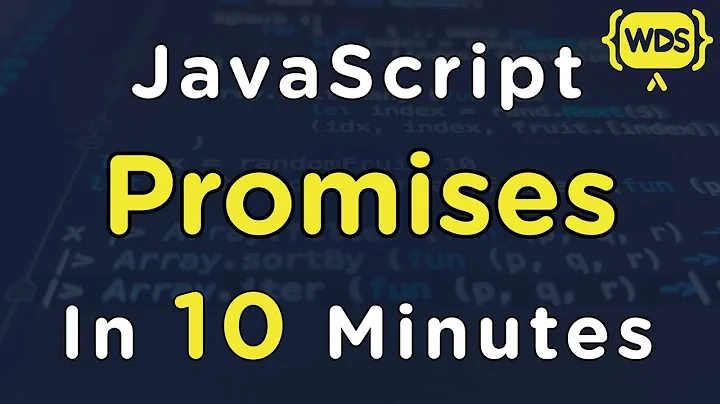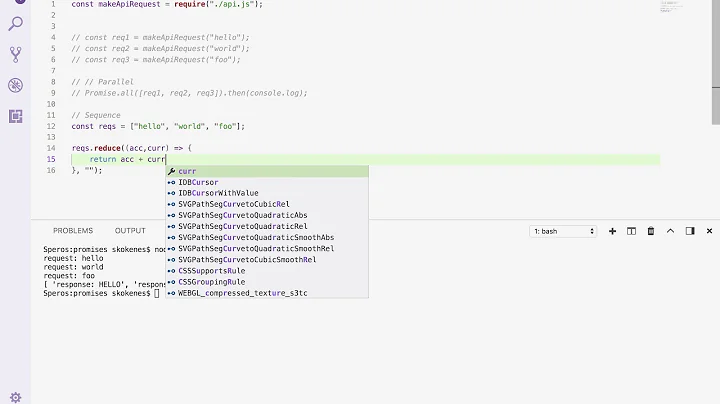How do I await multiple promises in-parallel without 'fail-fast' behavior?
Solution 1
ES2020 contains Promise.allSettled, which will do what you want.
Promise.allSettled([
Promise.resolve('a'),
Promise.reject('b')
]).then(console.log)Output:
[
{
"status": "fulfilled",
"value": "a"
},
{
"status": "rejected",
"reason": "b"
}
]
But if you want to "roll your own", then you can leverage the fact that using Promise#catch means that the promise resolves (unless you throw an exception from the catch or manually reject the promise chain), so you do not need to explicitly return a resolved promise.
So, by simply handling errors with catch, you can achieve what you want.
Note that if you want the errors to be visible in the result, you will have to decide on a convention for surfacing them.
You can apply a rejection handling function to each promise in a collection using Array#map, and use Promise.all to wait for all of them to complete.
Example
The following should print out:
Elapsed Time Output
0 started...
1s foo completed
1s bar completed
2s bam errored
2s done [
"foo result",
"bar result",
{
"error": "bam"
}
]
async function foo() {
await new Promise((r)=>setTimeout(r,1000))
console.log('foo completed')
return 'foo result'
}
async function bar() {
await new Promise((r)=>setTimeout(r,1000))
console.log('bar completed')
return 'bar result'
}
async function bam() {
try {
await new Promise((_,reject)=>setTimeout(reject,2000))
} catch {
console.log('bam errored')
throw 'bam'
}
}
function handleRejection(p) {
return p.catch((error)=>({
error
}))
}
function waitForAll(...ps) {
console.log('started...')
return Promise.all(ps.map(handleRejection))
}
waitForAll(foo(), bar(), bam()).then(results=>console.log('done', results))See also.
Solution 2
While the technique in the accepted answer can solve your issue, it's an anti-pattern. Resolving a promise with an error isn't good practice and there is a cleaner way of doing this.
What you want to do, in pseudo-code, is:
fn task() {
result-1 = doAsync();
result-n = doAsync();
// handle results together
return handleResults(result-1, ..., result-n)
}
This can be achieved simply with async/await without the need to use Promise.all. A working example:
console.clear();
function wait(ms, data) {
return new Promise( resolve => setTimeout(resolve.bind(this, data), ms) );
}
/**
* These will be run in series, because we call
* a function and immediately wait for each result,
* so this will finish in 1s.
*/
async function series() {
return {
result1: await wait(500, 'seriesTask1'),
result2: await wait(500, 'seriesTask2'),
}
}
/**
* While here we call the functions first,
* then wait for the result later, so
* this will finish in 500ms.
*/
async function parallel() {
const task1 = wait(500, 'parallelTask1');
const task2 = wait(500, 'parallelTask2');
return {
result1: await task1,
result2: await task2,
}
}
async function taskRunner(fn, label) {
const startTime = performance.now();
console.log(`Task ${label} starting...`);
let result = await fn();
console.log(`Task ${label} finished in ${ Number.parseInt(performance.now() - startTime) } miliseconds with,`, result);
}
void taskRunner(series, 'series');
void taskRunner(parallel, 'parallel');Note: You will need a browser which has async/await enabled to run this snippet.
This way you can use simply try/ catch to handle your errors, and return partial results inside parallel function.
Related videos on Youtube
Brandon
Updated on March 18, 2020Comments
-
 Brandon about 4 years
Brandon about 4 yearsI'm using
async/awaitto fire severalapicalls in parallel:async function foo(arr) { const results = await Promise.all(arr.map(v => { return doAsyncThing(v) })) return results }I know that, unlike
loops,Promise.allexecutes in-parallel (that is, the waiting-for-results portion is in parallel).But I also know that:
Promise.all is rejected if one of the elements is rejected and Promise.all fails fast: If you have four promises which resolve after a timeout, and one rejects immediately, then Promise.all rejects immediately.
As I read this, if I
Promise.allwith 5 promises, and the first one to finish returns areject(), then the other 4 are effectively cancelled and their promisedresolve()values are lost.Is there a third way? Where execution is effectively in-parallel, but a single failure doesn't spoil the whole bunch?
-
 Ben Aston over 7 yearsThe other four are not cancelled, but their results are not propagated along the promise chain (IIUC).
Ben Aston over 7 yearsThe other four are not cancelled, but their results are not propagated along the promise chain (IIUC). -
 Ben Aston over 7 yearsIf you want to avoid a specific failure mode rejecting the promise chain, then you can handle that failure in the sub-promise chain (using
Ben Aston over 7 yearsIf you want to avoid a specific failure mode rejecting the promise chain, then you can handle that failure in the sub-promise chain (usingcatch), thereby avoiding the fast-fail. Would this do what you want? -
Thomas over 7 years
const noop = function(){}Promise.all( arr.map( v => doAsyncThing(v).catch(noop) ) )turns an error into an undefined-value -
 Brandon over 7 years@BenAston do you mean instead of
Brandon over 7 years@BenAston do you mean instead ofreturn doAsyncThing(v),return doAsyncThing(v).catch(err => {return err})? ETA: I'm not sure what should go in thecatchbody--is there a way to pass the error object up w/oreject? So long as I can handle thereject()ed promises individually and still get the values from theresolve()d promises. re:cancelledvsnot propagated, i am not certain I understand the difference. Both result in lostresolve()values, yeah? -
 Brandon over 7 years@Thomas will the promises that were
Brandon over 7 years@Thomas will the promises that werereject()ed then end up in the resultsarrayasundefined? -
Thomas over 7 yearsyes. and if you write
.catch(err => {return err})theerrwill end up in the results array. Do you expect a 1:1 mapping from src to results-Array or do you only want the resolved values (in order)? How do you want to handle the rejected promises? ignore them? convert them into some (default-)Value? handle them by a callback-function? ... -
 Brandon over 7 yearsfor this particular use case I'll just be ignoring & counting the failures (eg, with
Brandon over 7 yearsfor this particular use case I'll just be ignoring & counting the failures (eg, withstatsd) for metrics purposes, so the 1:1 is not critical. however, I'm finding thatPromise.allis a pretty common pattern inasync/await, so I expect in the near future I'll want to handle them one-at-a-time.
-
-
 Peter Berg over 6 yearsreturn await is redundant fyi eslint.org/docs/rules/no-return-await
Peter Berg over 6 yearsreturn await is redundant fyi eslint.org/docs/rules/no-return-await -
FINDarkside about 6 yearsWhy do you even use .then when you already use await? You could just remove all .then calls and it would work.
-
 Ben Aston about 6 yearsI can’t remember. I think I was trying to elucidate.
Ben Aston about 6 yearsI can’t remember. I think I was trying to elucidate. -
Mr. B almost 6 yearsUnderappreciated. This is very clear exactly what is happening.
-
 David Schumann over 5 yearsthe output of your script does not include 'bar result' and 'bat result', but: done [ undefined, { "error": "bam" }, undefined ] is that intended?
David Schumann over 5 yearsthe output of your script does not include 'bar result' and 'bat result', but: done [ undefined, { "error": "bam" }, undefined ] is that intended? -
Bergi over 5 years"anti-pattern: resolving a promise with an error isn't good practice" - where did you get that from? No, on the contrary, your
parallelfunction is an antipattern that will potentially cause unhandled rejections. -
Bergi over 5 yearsAnd what's worse: this doesn't even solve the OPs problem. If
task1rejects beforetask2fulfills, you still are failing fast. -
 NoNameProvided over 5 yearswhere did you get that from? - Handling errors in
NoNameProvided over 5 yearswhere did you get that from? - Handling errors inthenis anti-pattern because Promises has a dedicated way of dealing with errors in thecatchbranches so developers expect values inthenand errors incatch. Mixing that up will lead to confusion for others who are not aware of your custom implementation details. -
 NoNameProvided over 5 yearsyour parallel function is an antipattern - if you read my answer you can find it in the bottom how to deal with that: "This way you can use simply try/ catch to handle your errors, and return partial results inside the parallel function." This is the answer for your second comment as well: And what's worse: this doesn't even solve the OPs problem.
NoNameProvided over 5 yearsyour parallel function is an antipattern - if you read my answer you can find it in the bottom how to deal with that: "This way you can use simply try/ catch to handle your errors, and return partial results inside the parallel function." This is the answer for your second comment as well: And what's worse: this doesn't even solve the OPs problem. -
Arvin over 5 yearsYa, I believe it should
return new Promiseso that we could get the correct results array: jsbin.com/ruralujame/edit?html,css,js,console,output -
Phanikiran about 5 yearsadding to David's comment, done [ undefined, { "error": "bam" }, undefined ] is returned. If you add return await and a then for bam, the results are displayed [Log] done – ["bar result", "bam result", "bat result"]. However I am unable to get the result done – ["bar result", {"error":"bam"}, "bat result"]. Is there a way to achieve this ?
-
John Bernardsson almost 5 yearsI am with @Bergi on this one (but you could be a bit less harsh pal :D ). After reading the link provided seems clear to me that the Promise.all technique is more concise, and allows to get the error in the moment one of the promises reject. Maybe it is true that you can use try/catch inside the Parallel function, but everything gets more cumbersome in my humble opinion. Peace folks!
-
Qwerty almost 5 yearsI would like to see the implementation with
try/catchas this doesn't behave as expected. I want both results to be settled, but when one fails, the function doesn't even return due toUnhandled Error. -
Piou over 4 yearsThis answer is actually very misleading on how promises and async/await work.
-
 Ben Aston about 4 yearsI downvoted because this answer does not make explicit the solution to the propagation of errors.
Ben Aston about 4 yearsI downvoted because this answer does not make explicit the solution to the propagation of errors. -
 Moaaz Bhnas over 3 yearsGreat explanation!
Moaaz Bhnas over 3 yearsGreat explanation!







